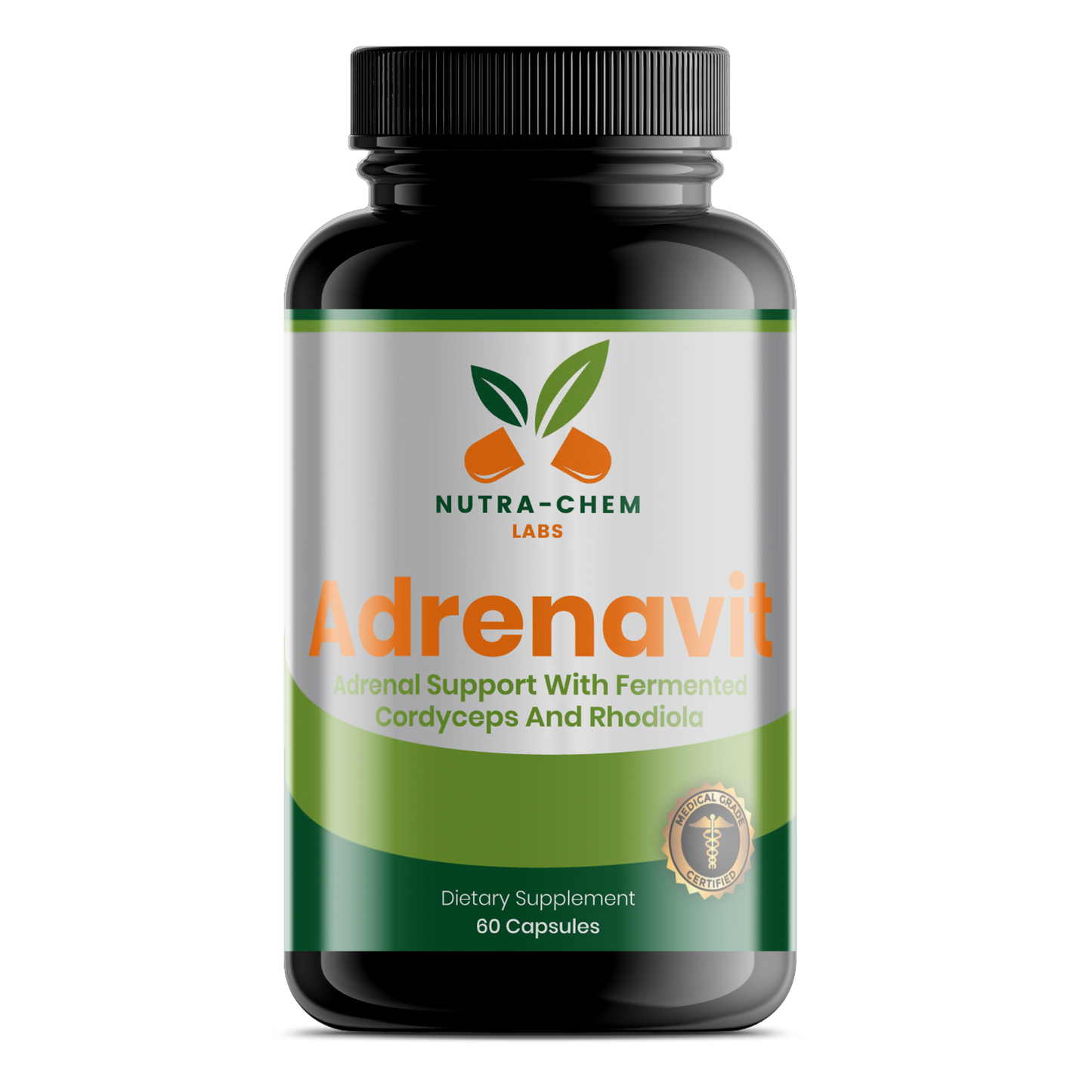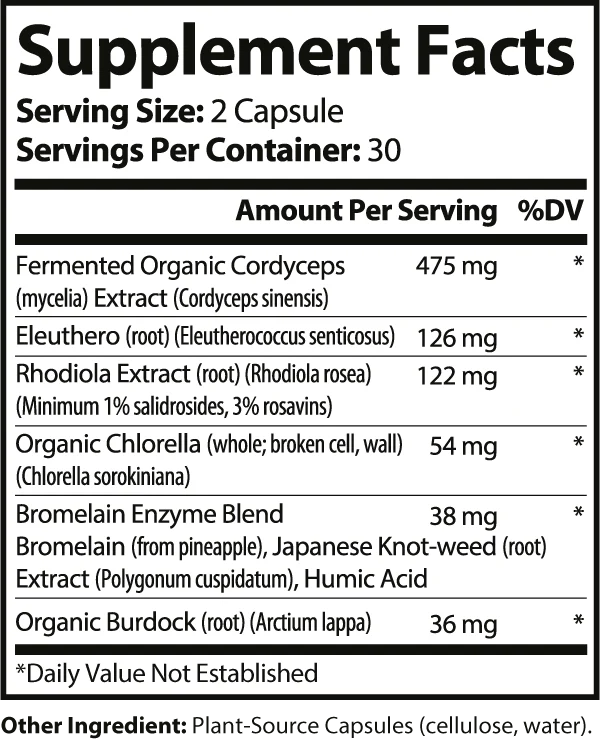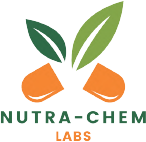- Description
- Key Ingredients & Benefits
- Usage & Directions
- Quality Standards
- Warnings
- Sources
Adrenavit is a premium supplement developed to support balanced stress levels, energy, immune function, and resilience to mental and physical burnout. This powerful blend of adaptogenic herbs and fermented Cordyceps, backed by Chinese clinical research, offers a unique formulation for people seeking both energy and immune enhancement. The formula is designed for flexibility, easily integrating with other supplements that target adrenal health.
-Fermented Cordyceps: Boosts stamina, immune function, antioxidant support, and kidney health while reducing fatigue.
-Eleuthero Root: Balances stress hormones by optimizing cortisol, testosterone, and estrogen ratios.
-Rhodiola Rosea Extract: Supports immune health, reduces inflammation, and improves cognitive function.
-Chlorella (Broken Cell Wall): Antioxidant-rich for DNA protection, cardiovascular health, detoxification, and mental health support.
-Organic Burdock Root: Enhances detoxification, cardiovascular, immune, and skin health through improved circulation.
-Bromelain Enzyme Blend: Regulates blood sugar, blood pressure, and supports cardiovascular health. Additionally aids in protein digestion and nutrient absorption.
Take 2 capsules at breakfast or before 2 P.M., or as directed by a healthcare professional.
Adrenavit is made in the USA in a GMP-certified, FDA-registered facility, surpassing 96% of market supplements in quality. Its bioavailable formula includes high-quality nutraceuticals, modularly designed to enhance cellular function when combined with other supplements for pituitary/adrenal support.
-*These statements have not been evaluated by the Food and Drug Administration. This product is not intended to diagnose, treat, cure, or prevent any disease. -Tamper Seal: Use only if the seal is intact. Consult your health care practitioner if you are pregnant or nursing, taking medications, or have a medical condition, before taking this or any other product. -Store in a cool, dry place. Keep out of reach of children.
13. W. L., Zhang, M. Y., Bai, R. Y., Sun, L. K., Li, W. H., Yu, Y. L., Zhang, Y., Song, L., Wang, Z. X., Peng, Y. F., Shi, H., Zhou, K., & Li, T. X. (2020). Anti-inflammatory effects of Rhodiola rosea L.: A review. Biomedicine & Pharmacotherapy , 121 , 109552. https://doi.org/10.1016/j.biopha.2019.109552
84. Wahab, A., Gao, K., Jia, C., Zhang, F., Tian, G., Murtaza, G., & Chen, J. (2017). Significance of Resveratrol in Clinical Management of Chronic Diseases. Molecules , 22 (8), 1329. https://doi.org/10.3390/molecules22081329
85. Liu, K., Zhou, R., Wang, B., & Mi, M. T. (2014). Effect of resveratrol on glucose control and insulin sensitivity: A meta-analysis of 11 randomized controlled trials. The American Journal of Clinical Nutrition , 99 (6), 1510–1519. https://doi.org/10.3945/ajcn.113.082024
86. Tomé-Carneiro, J., Gonzálvez, M., Larrosa, M., García-Almagro, F. J., Avilés-Plaza, F., Parra, S., Yáñez-Gascón, M. J., Ruiz-Ros, J. A., García-Conesa, M. T., Tomás-Barberán, F. A., & Espín, J. C. (2012). Consumption of a grape extract supplement containing resveratrol decreases oxidized LDL and ApoB in patients undergoing primary prevention of cardiovascular disease: A triple-blind, 6-month follow-up, placebo-controlled, randomized trial. Molecular Nutrition & Food Research , 56 (5), 810–821. https://doi.org/10.1002/mnfr.201100673
265. Bito, T., Okumura, E., Fujishima, M., & Watanabe, F. (2020). Potential of Chlorella as a dietary supplement to promote human health. Nutrients , 12 (9), 2524. https://doi.org/10.3390/nu12092524
266. Panahi, Y., Badeli, R., Karami, G. R., Badeli, Z., & Sahebkar, A. (2015). A randomized controlled trial of 6-week Chlorella vulgaris supplementation in patients with major depressive disorder. Complementary Therapies in Medicine , 23 (4), 598–602. https://doi.org/10.1016/j.ctim.2015.06.010
284. Das, G., Shin, H. S., Leyva-Gómez, G., Prado-Audelo, M., Cortes, H., Singh, Y. D., Panda, M. K., Mishra, A. P., Nigam, M., Saklani, S., Chaturi, P. K., Martorell, M., Cruz-Martins, N., Sharma, V., Garg, N., Sharma, R., & Patra, J. K. (2021). Cordyceps spp.: A review on its immune-stimulatory and other biological potentials. Frontiers in Pharmacology , 11 , 602364. https://doi.org/10.3389/fphar.2020.602364
300. Roxas M. (2008). The role of enzyme supplementation in digestive disorders. Alternative Medicine Review , 13 (4), 307–314.




